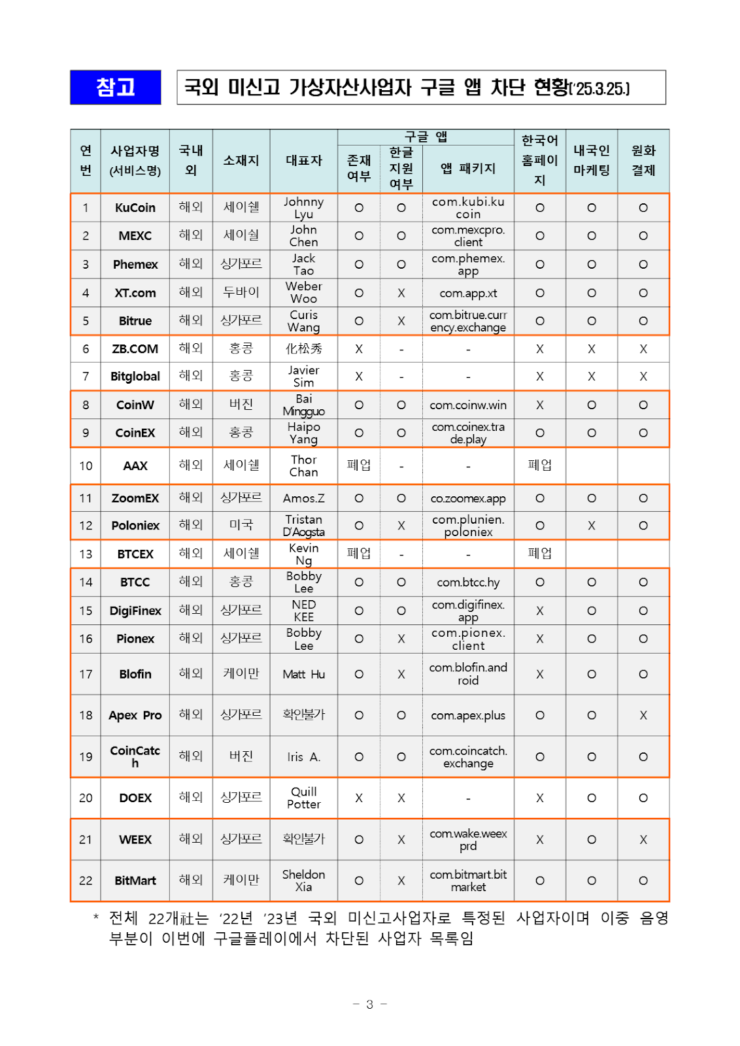South Korean regulators are tightening the noose around unregistered crypto exchanges, prompting Google Play to block access to 17 overseas platforms catering to local users. The move marks a significant escalation in the country’s ongoing push to curb unlicensed digital asset trading and potential money laundering risks.
The action, initiated at the request of South Korea’s Financial Intelligence Unit (FIU), restricts new downloads and updates for the affected apps, effectively limiting their reach in one of Asia’s most active crypto markets.
On March 26, the Financial Services Commission (FSC) published a list of 22 unregistered virtual asset service providers (VASPs), highlighting 17 now restricted on the Google Play Store. Notable exchanges facing access blocks include KuCoin, MEXC, Phemex, Poloniex, BitMart, CoinEx, and others.

The FIU, working closely with the Korea Communications Standards Commission (KCSC), said the restrictions aim to prevent money laundering and protect local users from potential financial harm.
Under South Korea’s Specified Financial Information Act, VASPs must register with local authorities to operate legally, a requirement these offshore platforms failed to meet.
Apple App Store, Internet Access Could Be Next
The FIU revealed it is also coordinating with Apple Korea and the KCSC to potentially block internet access and restrict these apps from the Apple App Store, signaling further enforcement actions could follow.
For now, existing users of the restricted apps will be unable to access updates, while new users are blocked from downloads—crippling the growth prospects of these exchanges within South Korea.
Among the blocked platforms, KuCoin responded by reaffirming its commitment to monitoring regulatory shifts, including in South Korea. The exchange stressed that compliance is essential for crypto’s sustainable growth but did not outline specific plans to meet South Korean requirements.
The regulatory action comes as South Korea ramps up scrutiny of domestic and foreign crypto exchanges. Just days earlier, Bithumb’s offices were raided over allegations of financial misconduct involving a former CEO accused of misusing company funds for personal gain.
Meanwhile, allegations surfaced of intermediaries accepting payments to list tokens on major South Korean exchanges like Bithumb and Upbit, sparking renewed regulatory attention.
South Korea’s aggressive stance mirrors a global trend of regulators cracking down on unregistered crypto exchanges, aiming to protect users and enforce anti-money laundering (AML) laws.
By leveraging app store restrictions, South Korean regulators are setting a new precedent, targeting accessibility as a key enforcement tool against non-compliant platforms.
What’s Next?
The FIU’s next steps with Apple and potential internet blocks will be closely watched as a test case for digital asset regulation worldwide. If successful, other countries could follow South Korea’s lead in applying platform-level restrictions against offshore exchanges.
For now, the message is clear: operating unregistered in South Korea’s crypto market is no longer an option and regulators have the tools to enforce it.





